Table of Contents
ToggleIn a world where smartphones are practically an extension of our hands and robots are starting to take over the dance floor, understanding emerging technologies has never been more crucial. These innovations are like the cool kids in school—always ahead of the curve and setting trends that everyone else scrambles to follow. From artificial intelligence to blockchain, these technologies aren’t just buzzwords; they’re reshaping industries and redefining how we live and work.
Understanding Emerging Technologies Definition
Emerging technologies encompass innovative advancements that drive change across various sectors. Recognizing their definition is essential for adapting to a rapidly evolving landscape.
Key Characteristics of Emerging Technologies
Rapid development characterizes emerging technologies like artificial intelligence, blockchain, and robotics. High potential for disruption exists within various industries. Unique applications often arise, showcasing their versatility. Unpredictable trajectories define growth, making them difficult to assess. Integrating new technologies necessitates agility in both organizations and individuals.
Importance of Defining Emerging Technologies
Accurate definitions guide strategic decision-making for businesses and policymakers. Comprehensive understanding supports effective resource allocation. Clarity encourages innovation while managing potential risks. Industry standards evolve based on these definitions, influencing regulations and compliance. Identifying emerging technologies fosters educational opportunities, preparing the workforce for future demands.
Categories of Emerging Technologies

Understanding the various categories of emerging technologies provides valuable insights into their potential impact. Each category represents a unique area of innovation that drives significant change.
Information Technology
Information technology encompasses advancements in computing, networking, and data processing. Cloud computing transforms how organizations access resources, allowing flexible and scalable solutions. Artificial intelligence enhances decision-making through machine learning algorithms that analyze vast amounts of data. Cybersecurity innovations protect sensitive information in an increasingly digital world. Internet of Things devices connect everyday objects, improving efficiency and automation in homes and industries.
Biotechnology
Biotechnology includes the manipulation of living organisms for practical applications. Genetic engineering allows the modification of genes to enhance disease resistance in crops and develop targeted therapies for illnesses. CRISPR technology enables precise editing of genetic material, offering groundbreaking possibilities in medicine and agriculture. Synthetic biology creates new biological systems or redesigns existing ones, fostering advancements in biofuels and pharmaceuticals. These innovations promise significant improvements in health, food security, and environmental sustainability.
Renewable Energy
Renewable energy focuses on harnessing sustainable resources for power generation. Solar energy technology advances photovoltaic cells, converting sunlight into electricity efficiently. Wind energy innovations improve turbine designs, increasing energy capture from wind currents. Geothermal energy utilizes heat from the Earth’s core, providing a stable energy source. These advancements contribute to reducing dependence on fossil fuels and decreasing greenhouse gas emissions, promoting a cleaner, more sustainable future.
Impact of Emerging Technologies on Society
Emerging technologies significantly shape societal structures by influencing various facets of daily life. Transformation occurs in economic frameworks, ethical values, and social interactions.
Economic Implications
Emerging technologies drive economic growth by creating new industries and job opportunities. Automation and artificial intelligence enhance productivity, leading to increased efficiency in processes. Businesses adopting these technologies often gain competitive advantages, as they can reduce costs and improve service delivery. The gig economy flourishes alongside innovations, enabling flexible work arrangements. Additionally, data analytics contributes to informed decision-making across organizations, optimizing resource management. Overall, these advancements reshape labor markets, requiring workers to adapt to evolving skill demands.
Ethical Considerations
Balancing rapid technological advancement with ethical standards poses challenges. Privacy concerns arise as data collection becomes more pervasive, prompting debates on data ownership and consent. Furthermore, biotechnology raises questions about genetic manipulation and its implications for humanity’s future. Fair access to emerging technologies remains critical; disparities in access could deepen socioeconomic divides. Accountability in AI decision-making processes is another ethical concern, especially in sectors like healthcare and law enforcement. Proactive engagement in ethical discussions encourages responsible innovation, fostering a culture that prioritizes societal well-being.
Challenges in Identifying Emerging Technologies
Identifying emerging technologies presents several challenges that require careful consideration.
Rapid Pace of Change
Innovations often evolve at an unprecedented speed, making it difficult to stay updated. Technologies may shift from novelty to necessity within months. Rapid advancements in fields like artificial intelligence and blockchain frequently outpace existing frameworks. Established definitions struggle to keep up, leading to confusion in classification. Organizations often face uncertainty regarding which technologies warrant investment or attention. As advancements continue to disrupt traditional sectors, agility becomes essential for businesses and policymakers alike. They must remain vigilant to capitalize on opportunities while navigating the risks that come with constant change.
Regulatory Issues
Regulatory environments lag behind technological advancements, complicating the identification process. Established regulations may not adequately address new innovations, creating a legal gray area for developers and users. Compliance challenges arise, risking delays in deployment of breakthroughs. Authorities frequently lack a cohesive strategy, making it harder for businesses to understand their obligations. As examples like data privacy laws highlight, regulations can vary significantly across regions. Stakeholders must actively engage with regulators to foster frameworks that support innovation while ensuring safety and ethical standards. Collaboration between the tech industry and regulatory bodies is crucial in shaping effective policies that adapt to emerging technologies.
Emerging technologies are reshaping the landscape of modern society. Their rapid evolution presents both opportunities and challenges that require strategic foresight and adaptability. By understanding these innovations, businesses and policymakers can make informed decisions that drive progress while addressing ethical considerations. The collaboration between the tech industry and regulatory bodies is essential for creating a balanced environment that fosters growth and innovation. As these technologies continue to evolve, staying informed and engaged will be crucial for navigating the complexities they introduce.






